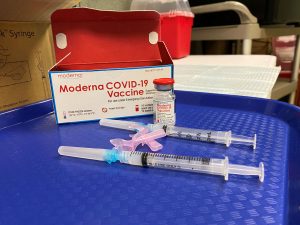The journal BMJ Public Health is placing an expression of concern on a paper it said “gave rise to widespread misreporting and misunderstanding,” namely, “claims that it implies a direct causal link between COVID-19 vaccination and mortality.”
The article, “Excess mortality across countries in the Western World since the COVID-19 pandemic: ‘Our World in Data’ estimates of January 2020 to December 2022,” appeared online June 3, and quickly attracted attention and criticism. The expression of concern is not yet live.
In their conclusions, the authors wrote:
Excess mortality has remained high in the Western World for three consecutive years, despite the implementation of COVID-19 containment measures and COVID-19 vaccines.
The next step, they wrote, was to distinguish “between the various potential contributors to excess mortality, including COVID-19 infection, indirect effects of containment measures and COVID-19 vaccination programmes.”
Lots of outlets covered the study. The Telegraph ran its story with the headline, “Covid vaccines may have helped fuel rise in excess deaths.”
The New York Post’s story took a similar angle, writing that the researchers found “excess mortality has ‘remained high’ since 2020 — despite the widespread rollout of COVID vaccines and various containment measures,” and quoting the paper’s statements about reported “serious injuries and deaths following vaccination.” The Post later corrected its story and added the following note:
An earlier version of this article did not reflect that the study did not analyze the impact of vaccination nor establish a link between mortality and vaccination status.
In response to the coverage, BMJ released the following statement:
Various news outlets have claimed that this research implies a direct causal link between COVID-19 vaccination and mortality. This study does not establish any such link. The researchers looked only at trends in excess mortality over time, not its causes. While the researchers recognise that side effects are reported after vaccination, the research does not support the claim that vaccines are a major contributory factor to excess deaths since the start of the pandemic. Vaccines have, in fact, been instrumental in reducing the severe illness and death associated with COVID-19 infection.
The message of the research is that understanding overall excess mortality since the COVID-19 pandemic is crucial for future health policy, but that identifying specific causes is complex due to varying national data quality and reporting methods.
In a similar episode, the New England Journal of Medicine added an editor’s note in 2017 to a 1980 letter published in the journal that, the note said, had been “‘heavily and uncritically cited’ as evidence that addiction is rare with opioid therapy.”
Despite BMJ’s statement, scientists critiqued the study’s methodology on X (formerly Twitter). Ariel Karlinsky, an economist at the Hebrew University of Jerusalem in Israel, whose work the study cited, wrote:
Karlinsky told Retraction Watch he and a few colleagues have submitted a commentary and request for retraction to BMJ Public Health.
Three of the authors (Saskia Mostert, Minke Huibers, and Gertjan Kaspers) are affiliated with the Princess Máxima Center for Pediatric Oncology in Utrecht, The Netherlands; the fourth, Marcel Hoogland, is identified as an “independent researcher” in Amsterdam. Mostert, the corresponding author, has not responded to our request for comment.
On June 11, the Princess Máxima Center issued a statement saying it “distances itself from the publication” and will “investigate the scientific quality of this study.” The statement added:
Originally, the idea was to look at the effect of COVID measures on, among other things, the mortality rate of children with cancer in low-income countries. During the course of the study, the focus shifted and diverted in a direction that we felt was too far from our expertise: pediatric oncology. We are not experts in epidemiology, nor do we want to give that impression. The Máxima Center therefore emphatically distances itself from this publication. We should have been more alert to the formation and results of this publication and will further investigate the way it was created. If it turns out that carelessness was involved in the realization of this publication, it will of course be withdrawn.
On June 13, BMJ sent a press release to reporters saying it is “investigating the quality of the research and the messaging” of the paper, and would place an expression of concern on the article.
BMJ’s press release concluded:
As part of the investigation the authors will be asked to review and respond to the concerns raised to BMJ about the quality and messaging of the paper. BMJ will then decide what further action is needed.
Update, 6/22/24, 1`600 UTC: The expression of concern has been published.
Like Retraction Watch? You can make a tax-deductible contribution to support our work, subscribe to our free daily digest or paid weekly update, follow us on Twitter, like us on Facebook, or add us to your RSS reader. If you find a retraction that’s not in The Retraction Watch Database, you can let us know here. For comments or feedback, email us at [email protected].

As Pepijn van Erp, a skeptical activist, noted on X, they also used “interesting” synonyms:
“Karlinsky and Tobak argue that their method is a trade-off between suppleness and chasteness”.
This comes from Karlinsky and Tobak describing their method as “a compromise between flexibility and simplicity.”
Trade-off instead of compromise is just fine, but suppleness and chasteness?
The expression of concern has now been published: https://bmjpublichealth.bmj.com/content/2/1/e000282eoc
The author has previously published a commentary criticising medical journal editors for turning a blind eye to corruption in healthcare and for rejecting their papers on the subject. The author concludes there is a need for “good and courageous people with high moral and ethical principles” to acknowledge healthcare corruption and do something about it. https://www.ijhpm.com/article_3641.html